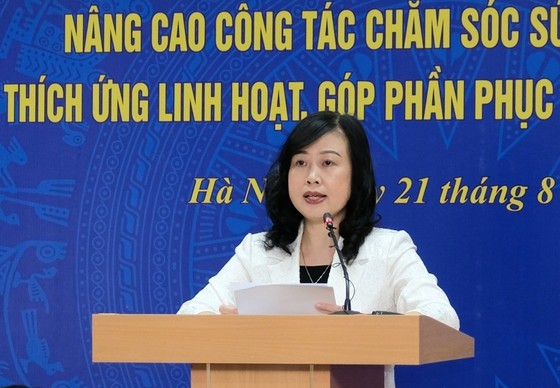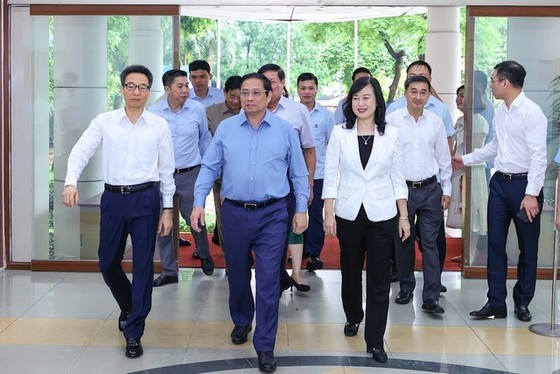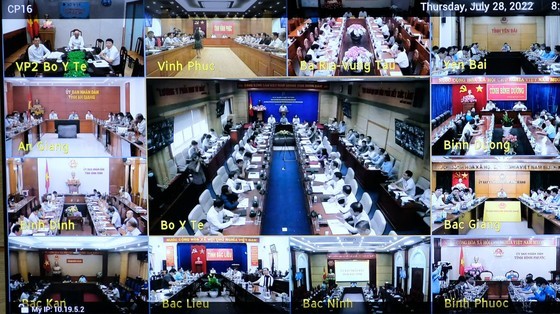 Acting Health Minister Dao Hong Lan speaks at the meeting. (Photo: SGGP)
Acting Health Minister Dao Hong Lan speaks at the meeting. (Photo: SGGP)
The Ministry of Health, on the morning of August 21, held a nationwide online conference on improving people's health care; proactively adapting flexibly, and contributing to quick recovery and sustainable development.
Prime Minister Pham Minh Chinh chaired the conference with the participation of Deputy Prime Minister Vu Duc Dam, and Chairwoman of the National Assembly's Social Committee Nguyen Thuy Anh.
Acting Health Minister Dao Hong Lan said that, together with the Party, the people, and the army, the health sector has overcome many difficulties and challenges caused by the Covid-19 pandemic to effectively control the disease and achieve positive and important results in the care and protection of people's health.
However, besides achievements, there are still many existing problems and limitations in medical work that need to be addressed early, such as the shortage of drugs, equipment, and medical supplies occurred at many medical establishments; the institutional system still has many shortcomings, and the regulations allowing the procurement and bidding of drugs and medical equipment, and investment are still limited as in the recent pandemic prevention and control; there are many shortcomings in health financing issues, such as health insurance face value, hospital autonomy, health insurance payment, joint ventures, socialization, and public-private partnership.
Prime Minister Pham Minh Chinh chaired the conference with the participation of Deputy Prime Minister Vu Duc Dam, and Chairwoman of the National Assembly's Social Committee Nguyen Thuy Anh.
Acting Health Minister Dao Hong Lan said that, together with the Party, the people, and the army, the health sector has overcome many difficulties and challenges caused by the Covid-19 pandemic to effectively control the disease and achieve positive and important results in the care and protection of people's health.
However, besides achievements, there are still many existing problems and limitations in medical work that need to be addressed early, such as the shortage of drugs, equipment, and medical supplies occurred at many medical establishments; the institutional system still has many shortcomings, and the regulations allowing the procurement and bidding of drugs and medical equipment, and investment are still limited as in the recent pandemic prevention and control; there are many shortcomings in health financing issues, such as health insurance face value, hospital autonomy, health insurance payment, joint ventures, socialization, and public-private partnership.
 PM Pham Minh Chinh and Deputy Prime Minister Vu Duc Dam attend the conference on improving people's health care; proactively adapting flexibly, and contributing to quick recovery and sustainable development. (Photo: SGGP)
PM Pham Minh Chinh and Deputy Prime Minister Vu Duc Dam attend the conference on improving people's health care; proactively adapting flexibly, and contributing to quick recovery and sustainable development. (Photo: SGGP)
"Medical service prices are slow to adjust, have not been accurately calculated, and fully cover actual costs, affecting the accounting of the revenue and expenditure of medical facilities, especially in the context that hospitals follow a self-regulatory mechanism. The change of payment methods by diagnosis-related group and by rate has been slow," emphasized Ms. Dao Hong Lan. She also said that challenges caused by changes in disease patterns, an increasing proportion of old people, globalization, urbanization, and climate change have been potentially containing many negative impacts on people's health. Meanwhile, people's needs and expectations of the provision of high-quality and timely medical services are higher. Moreover, medical workers at public health facilities leave and quit their jobs because the remuneration regimes and policies for attracting human resources in the health sector are neither guaranteed nor commensurate with the training process and the job level. Meanwhile, Resolution No.20-NQ/TW of the Central Committee and Resolution No.46/NQ-TW of the Politburo clearly stated that the medical profession is special. Health workers must meet professional and ethical requirements; they must be selected, trained, and employed, and must receive a special remuneration regime. Facing the above difficulties and inadequacies of the health sector, the Acting Minister of Health proposed the Government adopt policies to support tuition fees for students in the health and medicine majors, especially those in the majors that are difficult to recruit, and majors serving the preventive and grassroots health care system.
 The scene of the meeting.
The scene of the meeting.
The Government soon issued a Decree amending Decree No.56/2011/ND-CP dated July 4, 2011, of the Government, which increases the occupational incentive allowance for preventive and grassroots health workers to 100 percent. The Ministry of Health also suggested that the Government soon consider and issue a resolution on solutions and support policies for rural health workers; providing the highest level of occupational incentive allowance for health workers. The titles of doctor, preventive medicine doctor, and pharmacist, after recruitment, are ranked at salary level 2 for all job titles. The Ministry of Health also proposed medical officers and workers who died due to Covid-19 infection while performing their duties in the Covid-19 pandemic prevention and control be recognized as martyrs.
























